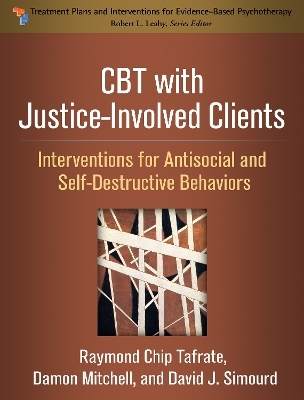
CBT with Justice-Involved Clients
Guilford Press (Verlag)
978-1-4625-3492-0 (ISBN)
- Titel z.Zt. nicht lieferbar
- Versandkostenfrei innerhalb Deutschlands
- Auch auf Rechnung
- Verfügbarkeit in der Filiale vor Ort prüfen
- Artikel merken
Winner--Significant Contribution Award, Criminal Justice Psychology Section of the Canadian Psychological Association
Raymond Chip Tafrate, PhD, a clinical psychologist, is Professor of Criminology and Criminal Justice at Central Connecticut State University. He co-chairs the Forensic Issues and Externalizing Behaviors special interest group for the Association for Behavioral and Cognitive Therapies, is a Fellow and Supervisor at the Albert Ellis Institute in New York City, and is a member of the Motivational Interviewing Network of Trainers. Dr. Tafrate frequently consults with criminal justice agencies regarding difficult-to-change problems such as anger dysregulation and criminal behavior. He has presented his research throughout North America, Europe, Asia, and Australia, and has published numerous journal articles, book chapters, and books. Damon Mitchell, PhD, a clinical psychologist, is Professor of Criminology and Criminal Justice at Central Connecticut State University. As a criminal justice consultant, Dr. Mitchell has developed and delivered training workshops related to forensic assessment and treatment and has conducted evaluations of criminal justice programs. He has published numerous journal articles and book chapters as well as a coedited book. David J. Simourd, PhD, CPsych, until his death in 2022, was in private practice in Kingston, Ontario, Canada, and had a 30-year career as a consultant/trainer, clinician, and researcher. Dr. Simourd published articles, delivered training workshops, and served as a consultant on offender assessment and treatment to a variety of correctional organizations throughout North America, Asia, and the Caribbean. He was on the editorial board of Criminal Justice and Behavior and was a member of the Ontario Review Board, the civil commitment board for mentally disordered offenders in Ontario. In 2019, he was elected as a Fellow of the Canadian Psychological Association.
I. Forensic Basics
1. The Forensic Treatment Landscape
2. An Integrated Forensic Cognitive-Behavioral Therapy Approach
II. Engagement
3. Successfully Engaging Justice-Involved Clients
4. Clarifying Values and Life Priorities
III. Assessment, Case Formulation, and Focus
5. Assessing Criminal Risk Domains
6. Case Formulation
7. Establishing Collaborative Goals and Focusing Conversations
IV. Detailed Treatment Plans for Criminogenic Thinking and Antisocial Orientation
8. Connecting Criminogenic Thinking to Decision Making in Criminal Risk Domains
9. Monitoring and Restructuring Criminogenic Thinking
V. Detailed Treatment Plans for Harmful Lifestyle Patterns
10. Developing New Routines: Leisure Activities and Employment/Education
11. Restructuring Relationships: Friends and Family
12. Managing Destructive Habits: Substance Use and Anger Reactions
VI. Practice Management
13. Documentation and Report Writing
Postscript
Appendix A. Standardized Test Recommendations
Appendix B. Resources for Practitioners
| Erscheinungsdatum | 11.07.2018 |
|---|---|
| Reihe/Serie | Treatment Plans and Interventions for Evidence-Based Psychotherapy |
| Verlagsort | New York |
| Sprache | englisch |
| Maße | 203 x 267 mm |
| Gewicht | 1000 g |
| Themenwelt | Geisteswissenschaften ► Psychologie |
| Medizin / Pharmazie ► Medizinische Fachgebiete ► Psychiatrie / Psychotherapie | |
| Medizin / Pharmazie ► Studium | |
| ISBN-10 | 1-4625-3492-9 / 1462534929 |
| ISBN-13 | 978-1-4625-3492-0 / 9781462534920 |
| Zustand | Neuware |
| Haben Sie eine Frage zum Produkt? |
aus dem Bereich


